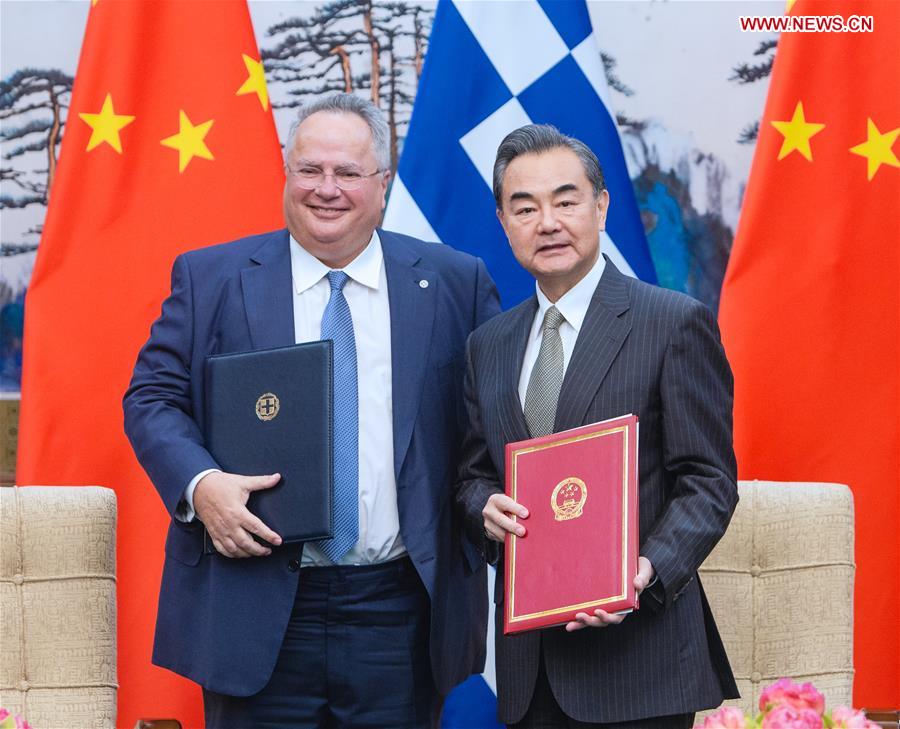The harmonious evolution of China-Greek relations
- By George N. Tzogopoulos
 0 Comment(s)
0 Comment(s) Print
Print E-mail China.org.cn, September 4, 2018
E-mail China.org.cn, September 4, 2018

The official visit of Greek Foreign Minister Nikos Kotzias to China, and his meeting with his Chinese counterpart and State Councilor Wang Yi reflects the current excellent state of China-Greek relations.
The two ministers signed a memorandum of understanding to foster collaboration under the Chinese-promoted Belt and Road Initiative (BRI), Greece becoming the first European developed state to sign such a document.
In the regular press conference of August 28, Foreign Ministry spokesperson Hua Chunying concentrated on the importance of Greece as a connection point of the maritime and the land silk routes that form the BRI.
The continuous investments of the Chinese company COSCO in the Piraeus Port have transformed it into a transshipment hub in the Mediterranean. Several international assessments are demonstrating its rising role, especially following the privatization of the Piraeus Port Authority.
Numerous ships find it more convenient to dock in Piraeus instead of crossing all the Mediterranean and dock in alternative ports in the Northern part of Europe. If the high-speed railway line connecting Piraeus to Budapest is eventually completed, trade connections between Asia and Europe, via Piraeus, will become faster and much more convenient.
Although the win-win results of COSCO's presence in Piraeus would seem to be very apparent, Germany – the leading power in Europe – is skeptical. It believes Greece is arguably undermining EU policy norms and cohesion by closely cooperating with China.
This German argument, which has started to be heard loudly since the 2017 summer, is reflected in the national media discourse. German media warn against hypothetical consequences of the China-Greek strategic partnership. Unsurprisingly, the signing of recent memorandum of understanding in Beijing has not been welcomed in Germany, either.
However, Germany tends to put its national economic interest above Greece's recovery. Instead of looking at how COSCO contributes to the creation of much-needed new jobs in the Piraeus region, it is solely concerned about a potential reduction of the Hamburg port trade volume.
Although Germany itself is benefiting by its own all-round strategic partnership with China, it cultivates an unfair climate of China-phobia in the EU in order to apply a screening mechanism for Chinese investments. Against this backdrop, some EU member-states are under European Commission pressure to avoid reaching business deals with Chinese companies.
An interesting case is currently evolving in the Eastern Mediterranean and affects Greek national interests. The Greek Independent Power Transmission Operator – whose strategic stakeholder is China's State Grid – has failed to agree with EuroAsia Interconnector for the establishment of an electricity connection between Israel, Cyprus and Greece.
The ELIA energy group, which operates in Belgium and Germany, is laying claim to be part of the project – apparently with the blessing of the German government. Final decisions are expected to be made in the next months.
Despite existing obstacles, China-Greek relations cannot but continue to develop harmoniously. COSCO, for instance, has announced an ambitious master plan to further improve the Piraeus port facilities by placing emphasis on logistics, the cruise sector and the ship-repair zone. In addition, Air China has launched direct flights between Athens and Beijing.
The activities of Chinese companies in Greece are facilitated by the positive image of China. Defying the negative signals coming out of both the European Commission and Berlin, most Greek citizens regard China a reliable economic partner and are sympathetic vis-à-vis Chinese people.
A better coordination of actions between scholars and journalists of the two countries will contribute to an even better common understanding. One positive is that Nikos Kotzias gave talks before prestigious research organizations such as the Chinese Academy of Social Sciences and explored cooperation opportunities during his stay.
Thus, the visit of the Greek Foreign Minister in China was successful. Talking to journalists after his meeting with Wang Yi, Kotzias also said he had extended an invitation from Prime Minister Alexis Tsipras to President Xi Jinping to visit Athens. The potential visit in Athens will certainly elevate the bilateral China-Greek relationship to an even higher level.
George N. Tzogopoulos is a columnist with China.org.cn. For more information please visit:
http://www.ccgp-fushun.com/opinion/GeorgeNTzogopoulos.htm
Opinion articles reflect the views of their authors, not necessarily those of China.org.cn.





